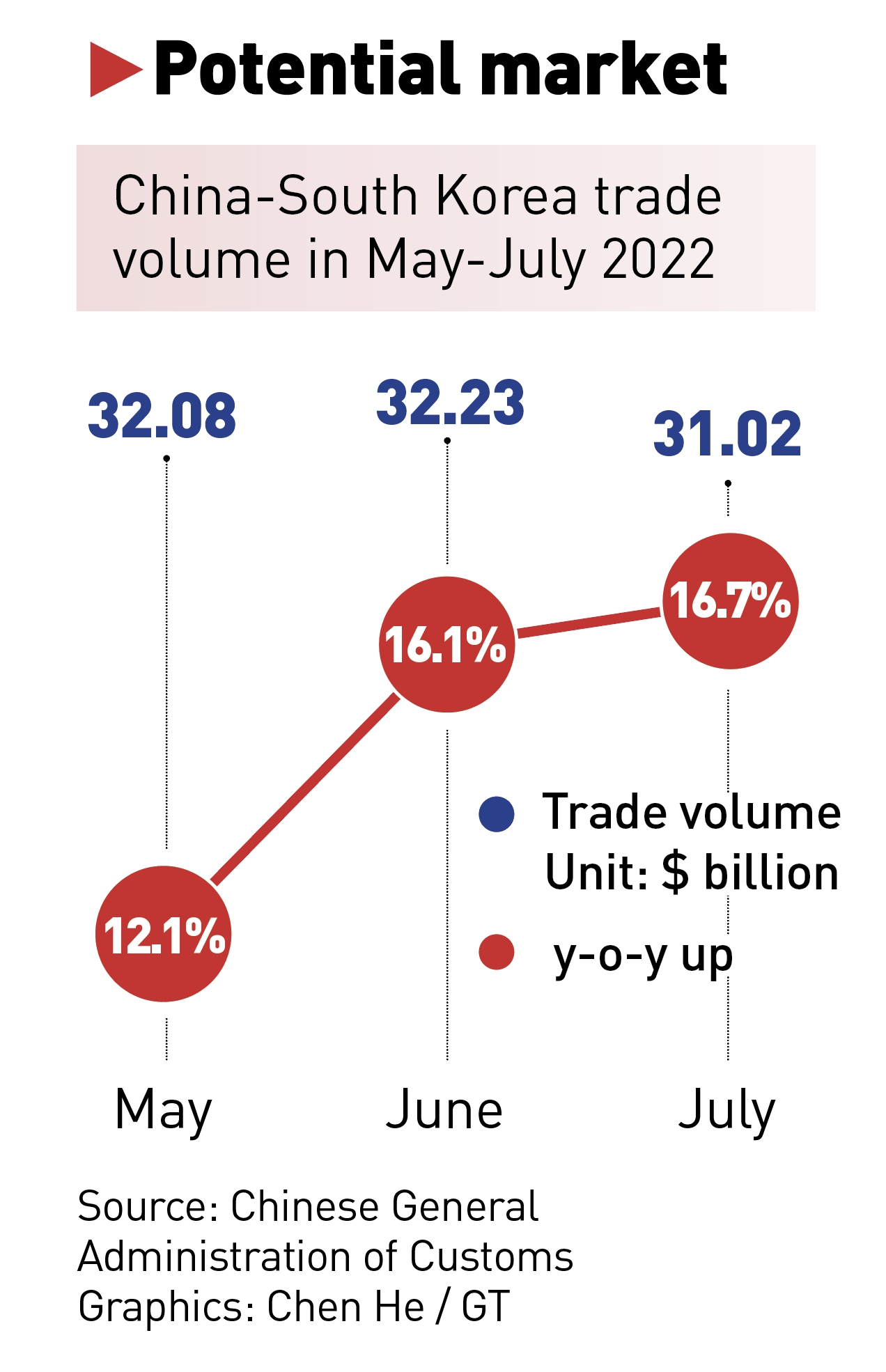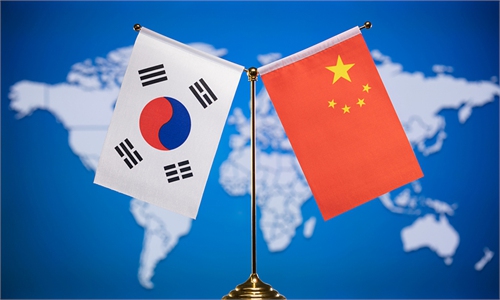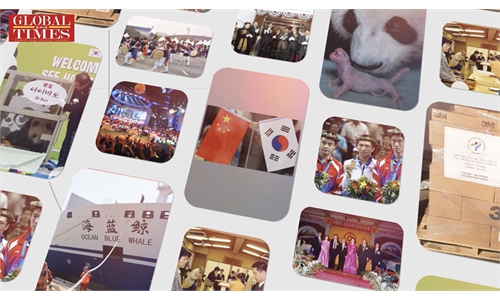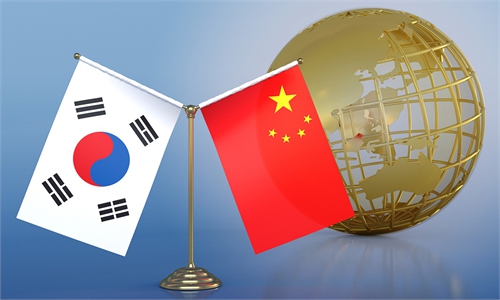South Korea expected to make pragmatic decision on BRI as initiative set to align with its economic plan, facilitate third-market cooperation
Building on 30 years of ‘flourishing business ties,’ initiative set to align with Seoul’s economic plan: analysts

South Korean food being exhibited during the 2021 China International Fair for Trade in Services Photo: VCG
As Wednesday marks the 30th anniversary of the establishment of diplomatic ties between China and South Korea, scholars and entrepreneurs have expressed high hopes that the Yoon Suk-yeol government - building on the momentum of "flourishing business ties" - will join the Belt and Road Initiative (BRI), which they believe will be synergized with South Korea's economic blueprint in creating a cross-continental Eurasian logistics network, while facilitating deeper integration of high-tech industrial chains, paving the way for the two neighbors' joint exploration of third markets.
Amid Washington's fear-mongering over the BRI and increased pressure targeting Beijing, the stakes over South Korea's participating in the BRI are very high, as it will bring a "quantitative elevation" in bilateral relations and further cement mutual trust, analysts have claimed. Many have predicted that Seoul will "cautiously" make a pragmatic decision based on its own economic development deeds, and start with carrying out BRI-relevant projects which include "active inputs."
"Now China and South Korea have built a close partnership just like the Chinese saying goes 'the cypress is delighted to see a flourishing pine.' China and South Korea are close neighbors that share common historical and cultural roots, and it is very inspiring and encouraging for them to see each other's progress," Hong Chang-pyo, president of Chinese Regional Headquarter of Korea Trade-Investment Promotion Agency (KOTRA), told the Global Times on Thursday.
KOTRA is a trade facilitation body funded by the South Korean government.
According to Hong, bilateral economic relations between China and South Korea are now tilting toward high-tech sectors including auto, semiconductors, display panels, telecommunication equipment, biotech and healthcare, which compared with labor-intensive products three decades ago points to more mature and intertwined business ties.
South Korea's exports to China have increased by more than 160 times since the establishment of diplomatic ties 30 years ago, Yonhap News reported on Tuesday, citing data from the Korea International Trade Association. And China is now South Korea's biggest trading partner, reportedly accounting for 70 percent of the latter's semiconductor exports.
Increasing calls
Jeon Hong-jin, a former official of South Korea's Gangwon-do province who has published a book elaborating on the benefits of BRI, told the Global Times on Thursday that "if the South Korean government looks to promote the economic policy and drive its economy, it is indispensable to participate in BRI and deepen cooperation with China under the initiative."
To date, the Yoon government has neither announced a clear stance on BRI nor articulated an economic roadmap. But Yoon's predecessor Moon Jae-in held a firm and positive view on the mega infrastructure initiative. He said in a meeting with Chinese top leadership in 2019 that South Korea "stands ready to jointly build the BRI with the Chinese side and cooperate in expanding third-party markets," according to a statement on the website of China's Ministry of Foreign Affairs.
"The BRI speeds up economic integration in Southeast Asia and Northeast Asia. Also within the framework of BRI, the China-Mongolia-Russia Economic Corridor has been set up, opening up an alternative transit route between China and Europe," Jeon said, highlighting how BRI could align with Korea's economic development blueprint.
Observers also noted that the China-Europe freight train, a key pillar of global inland transportation network under BRI, also expands scope of third-party cooperation between China and South Korea.
"Transferring Korean exports to China, and then shipping by the train to European markets saves logistics cost and improves efficiency," Jeon added, stressing that a range of BRI cooperation opportunities also lead to further improvement of bilateral ties and strengthened mutual trust.

Graphic: Chen He/GT
A 'viable' approach
It is likely that the Yoon government will conduct a "careful calculus" and weigh on all factors in making the final decision on the BRI, Lü Chao, an expert on the Korean Peninsula issue at the Liaoning Academy of Social Sciences, told the Global Times, suggesting that at the initial stage, Seoul would avoid a "high-profile" entry and will seek a "more viable approach" such as participating in BRI-related projects with substantial inputs.
The US has, on the other hand, ramped up pressure on South Korea, attempting to force it to side with Washington in its relentless crackdown against Beijing. The US also lambasted the China-proposed BRI by hyping claimed "debt trap," and launched a skeptical plan called the Partnership for Global Infrastructure and Investment PGII as a counter.
"It is worth noting that Seoul attaches high importance to its diplomatic relations with China, highlighted by the high-level celebration of the 30th anniversary on Wednesday. China-South Korea cooperation is manifested in various sectors and leads to win-win result, and that's another factor that needs to be taken into account," Lü said, noting that the manner in which South Korea responds under US pressure carries significant weight.
According to media reports, South Korea has distanced itself from the US-led "Chip 4" by calling it a "semiconductor supply chain consultative body." Seoul has been asked by the US to confirm its membership by the end of August.
According to Hong, semiconductors account for the largest share of bilateral trade volume, indicating a broad prospect for future high-tech cooperation amid China's industrial push for manufacturing and technological transformation and upgrade.
Hong said South Korean companies are also keen to invest in services and consumption-related industries in the world's second-largest economy. Besides, climate change and environmental protection is another potential sector which the two neighbors could strengthen cooperation, as both China and South Korea have laid out detail roadmap for achieving carbon neutrality goals.
"In the next thirty years or even a hundred years, the two countries will join hands to create a better future based on solid foundation of their three-decade friendship," Hong noted.




